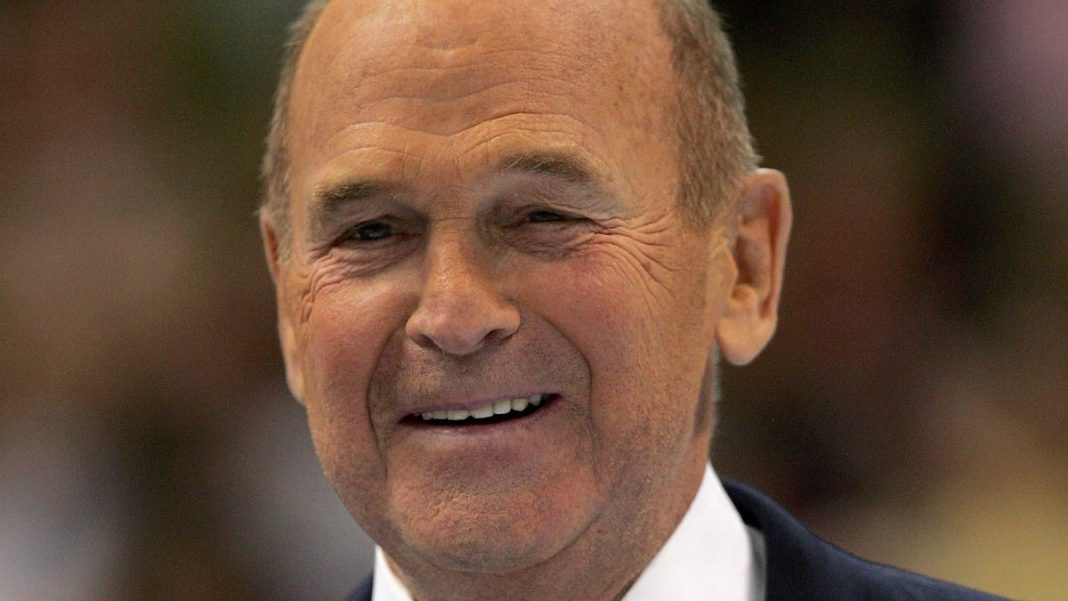Dick Button passes away at 95: A legend in figure skating and an esteemed educator
There was an era, quite some time ago, when figure skating captured the hearts of millions on television, with Dick Button being its most iconic figure and a significant force in the sport.
Button, who passed away at the age of 95 on Thursday, symbolized figure skating for countless Americans from the 1960s through the late 20th century and continuing into part of the 21st century.
He was the first American to win an Olympic gold medal in figure skating, achieving this feat in 1948 and again in 1952, introducing the public to the intricate and often dramatic world of jumps, spins, falls, and emotional moments.
Button had the power to elevate skaters to stardom with just a word. A triple jump didn’t garner respect if he didn’t endorse it. His emotional response in the ABC Sports commentary booth when Randy Gardner and Tai Babilonia had to pull out of the pairs competition at the 1980 Lake Placid Winter Olympics resonated with fans who cried alongside him.
Audiences trusted him, and justifiably so, since few can match Dick Button’s impact in the realm of sports. As a trailblazing superstar, an innovator, a savvy businessman, and a powerful influencer, he was to figure skating what Arnold Palmer was to golf, expanding the sport’s reach and generating significant revenue during the rise of television viewership in America.
Moreover, Button became the Howard Cosell of figure skating—a sophisticated, tuxedo-clad, Harvard-educated television figure who served as the confident moral compass of the sport.
“He was like a professor,” reflected his long-time broadcasting partner, Olympic gold medalist Peggy Fleming, in a phone conversation. “He educated viewers on how to appreciate skating. Sometimes, he acted like a professor beside me as a commentator, and if I made a grammatical mistake, he’d jot me a note while we were live on air.”
Even those who were unaware of Button’s impressive background as an athlete and entrepreneur found him indispensable, as he was always present to clarify and enhance their understanding of figure skating.
And indeed, viewers embraced figure skating en masse. Today, like many sports, skating struggles to capture any significant television audience. But back in March 1996, following the widely publicized Tonya-Nancy scandal, when there were only a handful of channels and Dick Button and Peggy Fleming dominated the scene, consider this remarkable statistic:
At the world figure skating championships, the live broadcast of the men’s long program on ABC, featuring Button as commentator, achieved a 10.1 rating.
In contrast, live NCAA men’s basketball coverage on CBS registered an 8.8 rating.
I had known of Dick Button long before I encountered him in person. My first memory of his commentary during an Olympic moment was in February 1976, while watching the Winter Games in Innsbruck, Austria, with my family back in Toledo.
Dorothy Hamill had just dazzled with her long program, and Button’s voice rose in excitement. He proclaimed that flowers were “raining” onto the ice.
“She has succeeded! I am certain!” he exclaimed.
At that moment, I had never heard such confidently joyful words from a sports announcer.
Nearly two decades later, when I finally met him, he corrected me almost immediately. While working on my book “Inside Edge” in 1994, I interviewed him and naturally began to ask about his role as the sport’s most renowned commentator.
He interrupted me.
“I am a narrator,” he clarified. “I do not commentate on skating. I narrate it.”
Understood, I replied. This marked the start of a fruitful working relationship, wherein we would often converse at skating events, and I would seek his insights on various skaters, sometimes sharing my thoughts with him.
I joined the ABC/ESPN figure skating commentary team alongside Button in 2005 for a couple of years. One unforgettable morning, as Button, Fleming, and I found ourselves stranded in an SUV with other team members on a highway overpass during an ice storm in Portland, Oregon, en route to the venue.
Button, at the age of 75, decided to take action. What action, we were unsure. He opened the car door.
“No, Dick,” we all warned.
He stepped out onto the icy roadway, cautiously gripping the car door. After taking a couple of steps, he paused to assess the situation before venturing a few more steps without holding on.
Was he considering walking to the arena?
In that moment, I found solace in knowing this was a man with two Harvard degrees, who also happened to have significant expertise in navigating icy terrains.
The remarkable Dick Button climbed back into the vehicle.

